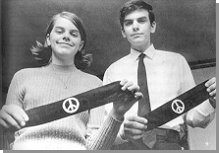Happy 40th, tweens, teens and Tinker!!
That’s right. On February 24, 1969, the U.S. Supreme Court declared that students are persons with fundamental rights in-and-out of school. The Court recognized that the classroom is a marketplace of ideas that depends on the robust exchange of ideas. Students do not “shed their constitutional rights to freedom of speech or expression at the schoolhouse gate.”
 Mary Beth and John Tinker (1969)
Mary Beth and John Tinker (1969)
In December, 1965, John (15) and Mary Beth (13) Tinker and their friend, Chris Eckhardt (15), wore black armbands to school as a symbolic protest against the Vietnam War. They were sent home and told that they could return but without the armbands. They and their parents challenged the school’s action and on February 24, 1969 won their case before the nation’s highest court.
Watch a 2007 interview with Mary Beth Tinker including a discussion about student expression over the past 40 years.

Photo by dbking (Flickr)
When contacted in January, 2009, John Tinker commented about 21st century communications and freedom of speech. He said that “Computers do not change the spirit of the First Amendment . . . government may not frustrate our right to communicate our thoughts and ideas to others.”
You’ll find a number of cases on this site whose decisions were based on the landmark Tinker v. Des Moines Independent School District ruling. Student expression under the First Amendment has been extended beyond the silent protest of armbands* to other forms of pure and symbolic speech. In each case, it is the Tinker test of disruption or violation of another’s rights that the courts continuously look to in determining if the form of expression is protected speech or not.
A developing area of the law that the Supreme Court will likely address in the near future regards student speech on the Internet. (see “You and the Internet” on this site). Lower courts have differed in their rulings about whether you can be disciplined by your school for both on-and-off-campus Internet activities (i.e. emails, blogs, personal pages on MySpace, Facebook, etc.). Once the Court decides to hear one of these cases, the Tinker test will undoubtedly be applied.
Teen Cyberbullying Investigated: Where Do Your Rights End and Consequences Begin? was published in 2010 by Free Spirit Publishing. The book presents real cases of teens caught up at school and with the law for their Internet/e-communications, including texting and sexting.
*Even after four decades over student speech, the battle continues. In September, 2008, an Arkansas federal court decided another case involving armbands. Three middle school boys wore black armbands to school to protest the school’s dress code – uniforms were required. They were disciplined and they took the matter to court which ruled in their favor. (Lowry v. Watson Chapel School District).



